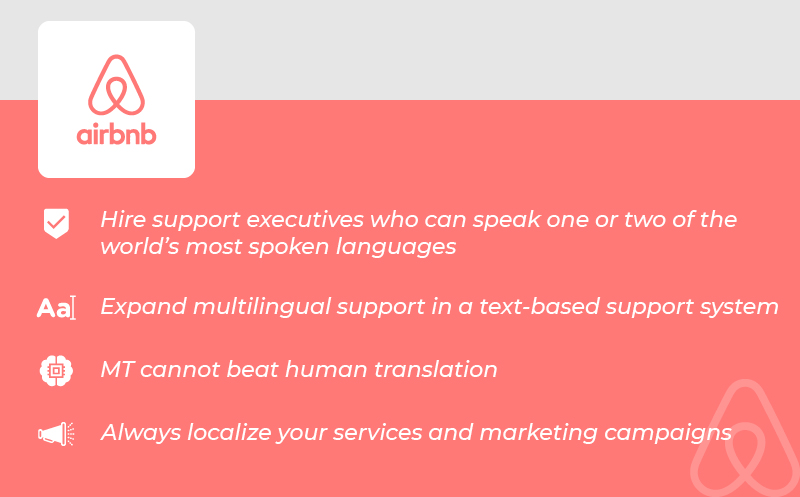As discussed in the first article of this series, the evolution of customer service led to growing awareness about speaking the customer’s language. Customers feel heard when you can speak their ‘heart language’ – their mother tongue or the language in which they think and internalise their outer experiences. Some of the world’s most successful companies realised this and have kept their ‘localization’ game on point. In this article, we will see what those companies did and why multilingual customer service is so crucial for long-term success.
First, let’s understand why every company needs multilingual support:
Builds loyalty and trust
Typically a customer service ticket is full of ‘language’ where customers express a challenge, problem or difficulty they have faced. A 2014 report stated that 74% of customers were more likely to purchase from a company that offered post-sales support in a native language. The same report also found that over 58% of businesses that offered multilingual support had customers that were more loyal to their brand because of it.
Results in higher sales
In the customer service domain, you must never underestimate the power of word-of-mouth. When you offer a post-sales or support service in regional languages in specific areas, you are indirectly marketing for your own brand. This leads to an increase in sales since satisfied customers become your brand advocates.
Leads to productive feedback
When customers find support services in their own language, they feel more comfortable speaking their minds. They are willing to invest time in giving you suggestions and feedbacks. This leads to improvements and efficiency.
Creates valuable cultural insights
For instance, consider the word ‘you’ which is used to refer to any person in English. In languages such as German, Spanish, French etc., there are two separate words to refer to someone formally and casually. The ability to incorporate such cultural nuances in customer service helps when interacting with multilingual or foreign clientele.
The Brands that Nailed the Localization Game
Imagine living in Istanbul – a cosmopolitan Turkish city where people speak more than one language and use a cab service on a regular basis. Now think of the amount of confusion it would create when a local rider only speaks Arabic, the native driver only speaks Turkish while the cab service operates their business in English. Despite the best of services, the cab service will need to evolve into a multilingual culture to succeed. World taxi service leader Uber faced a similar challenge.
How Uber Catered to the Chinese Language Speakers in Toronto
Back in 2016, Uber learned that over 20,000 riders in Toronto had used their app in traditional or simplified Chinese language. The company, baffled by the growing number of Mandarin-speaking users, decided to address the language barrier. Sure enough, the company launched uberCHINESE in Toronto. This catered to the needs of the existing Mandarin-speaking population as well as several Chinese tourists who used Uber. What exactly did this mean?
Uber hired Mandarin-speaking driver-partners specifically to help users who were speaking that language. This, in fact, has been a deliberate strategy of the company. Uber doesn’t just localise by country or language but also by city. In January this year, Uber launched UberLITE in seven Indian languages to cater to the growing regional language base of users. Launched as a pilot project in Delhi, Jaipur, and Hyderabad, UberLITE was eventually offered in Hindi, Marathi, Tamil, Telugu, Kannada, Bengali, and Gujarati – languages spoken in some of the densely populated cities such as Mumbai, Delhi, Ahmedabad, Bengaluru, Kolkata, Chennai, and Hyderabad.
As part of its globalisation strategy called ‘launch playbook’, Uber continues to explore markets where it can differentiate from local taxi-hailing services through the multilingual component. Today, Uber caters to 450+ cities in more than 65 countries and 32 languages.

Airbnb’s Language Advantage
#OneLessStranger is the hashtag that Airbnb has created for Twitter and Instagram. Their customers use it to share amazing stories of human connections throughout the globe. Imagine while visiting a country, your BnB host welcomes you in your own language. You feel the ice melting away instantly. This is precisely how Airbnb’s multilingual strategy has touched people’s lives inspiring several stories organically.
Sourcing Native Speakers as Service Providers
Airbnb didn’t hit the jackpot overnight. Its first-ever customer experience team provided support in English for obvious reasons. Eventually, as Airbnb collaborated with homeowners who spoke several languages, the company realised that its customer support services needed to evolve as well. Today Airbnb provides text-based support in 20 languages. The company uses dependable tools such as Zendesk for providing assistance with multilingual capabilities. Airbnb also offers phone-based support in 11 languages, while English and Mandarin support is provided 24/7.
What’s unique about Airbnb’s support system is that most hosts also play problem-solvers or support executives where they directly chat with customers in their own language and provide assistance. Airbnb acted on the assumption that many people are bilingual or trilingual in Asia, Europe and other parts of the world.
Customer Care Needs a Human Touch
While Airbnb automates its text support system with multilingual capabilities, it has support executives speaking one of 11 leading world languages and a whole community of linguist hosts who are ready to support customers. Even though Airbnb uses machine translation (MT) tools, the company realises that MT caters to those users who cannot read the local language. One of their valuable findings was that the UX with MT was not always better than reading a second language with a little difficulty. As a result, MT is part of Airbnb’s interface; many users either don’t need it or prefer communicating with a host who can speak their language.
This kind of language-specific support has clearly helped Airbnb in its sales and growth. Possibly deriving lessons from its multilingual support system, the company uses local strategies in its marketing campaigns flawlessly. For instance, their campaign #OneLessStranger had different interpretations when translated into other languages. In German, the word for ‘stranger’ is equivalent to ‘foreigner’ which indirectly entails a negative connotation. Therefore, Airbnb tweaked the phrase in different languages to connect with customers better.

Booking.com Employs Linguists for Customer Support
At Booking.com, the number one criterion for hiring support executives is their ability to answer calls in multiple languages. Being in the travel space just like Airbnb, Booking.com realises that travellers need support for all kinds of reasons. Currently, Booking.com operates in more than 220 countries and territories. The company’s biggest observation is that 20% of their customers speak to them over the phone and despite being multilingual, they prefer to speak in their own native language.
Some facts that The Priceline Group, owner of Booking.com, learned –
- 30.8% of their customers speak English
- 13.9% of their partners or hotel owners speak English
These figures are telling. Today, Booking.com has 6,000 full-time customer service employees, who speak English and one other native language. Some of those employees who live in Europe speak up to three or four languages. Moreover, the company pays more for every extra language a customer support executive knows. That’s because such an executive automatically becomes an asset for the company.
The Importance of Cultural Training for Support Executives
Another fascinating fact about Booking.com is they test the fluency of their support executives and help them learn a new language. The company today offers services in 42 languages, and that includes support. The company has an option of automating the linguist-savvy customer service system by hiring freelance translators or outsourcing to call centres that may have more linguists than their own department. Yet, Booking.com believes that training its own people and allowing them to handle calls results in quality service.
How do they find skills in specific regions where qualified candidates may not be available? Booking.com then tries innovative ways to get people on the job. For instance, the company needed a Portuguese-speaking executive for its Orlando call centre. The recruiters advertised in soccer stadiums and Brazilian cultural events and found the right candidate.
The company also staffs its customer support call centres not only based on the popularity of languages but also through understanding cultural nuances. For instance –
- They receive a lot of calls from emerging markets such as Brazil and China since those users are new to online booking
- Their Dutch customers call the least number of times
- South Americans stay on their calls for longer so they hire more Latin languages-speaking executives to balance the volume
Human Translation over Machine Translation
Booking.com was founded in Amsterdam – a city where people speak more than two languages. This played a large role in shaping the company’s culture. Apart from hiring linguist support executives, the company also hires a large group of translators to work on its websites. The company prefers human translation over a software program. In the words of Booking.com’s former CEO Darren Huston, “If you use a software program to translate something from Chinese to Polish, it will usually translate first from Chinese to English, and then from English to Polish. That extra step leads to lower quality results.”

When we speak in the language of our customers, we speak to their hearts. Remember that a majority of purchase decisions are made out of emotions. It also adds to the credibility of the brand and creates brand evangelists.
Stay tuned as we provide more insights into customer service and effective localisation in the next article.



